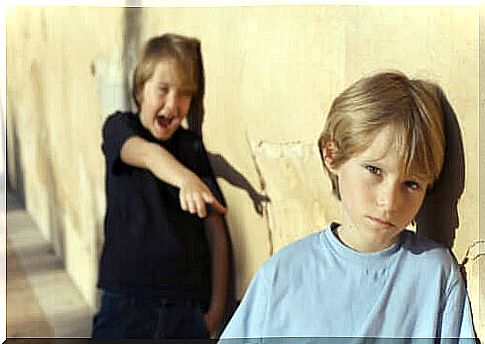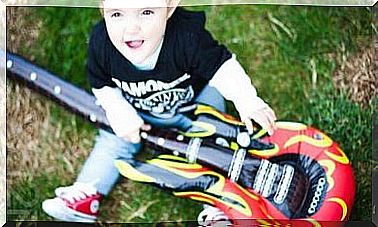Teaching Children To Deal With Teasing

Nowadays there are many children who no longer want to go to school because they are often made fun of by their classmates. The jokes, however, do not take place only in the school center, but from anywhere (in the park, on the bus, in the courtyard, etc.). Following this, it is very important to teach children to deal with teasing.
Despite the efforts of families and educational centers to create a climate of cooperation, it is very difficult to prevent teasing. When they are laughed at, children feel bad, ridiculed, etc. Parents cannot always protect their children from these unpleasant and hurtful situations.
In light of this, it is important to provide the smallest with tools and strategies to help them cope with these situations. If we teach them at an early age, they will be better prepared to handle conflicts before, during and after adolescence. Would you like to know more? Read on.
Before teaching children to deal with teasing: reasons why they tease others
Attract attention
Teasing is a way to get attention, even if it is negative. It is better to feel that others are paying attention, albeit for a negative event, than to be ignored.

Feelings of superiority and power
This point can be perfectly explained in the words of Olweus, a scholar of bullying:
Acceptance by the group
The sense of belonging to a group can be so strong that children make fun of others to be accepted by the most popular ones.
Don’t accept the differences
On many occasions the little ones do not understand the differences, they are not familiar with them, be they cultural, race, physical, etc. Instead of offering help and understanding to those who are “different”, therefore, they make fun of it.
Imitation
Some children mimic what they see at home in other environments in which they move and act in the same way with their schoolmates.
It is possible, for example, that these children live in a family environment that causes them fear or in a context of violence.
Techniques for teaching children to deal with teasing
- Strengthen their security with love.
- Help children develop the ability to laugh at themselves.
- Teach children not to be afraid of what others will say. If the mockery is frequent over time, however, parental intervention is advisable.
Teach children to deal with teasing with suitable answers
Ignore them
Children who make fun almost always give up when they see that they are being ignored. For this reason, we can teach our children that when someone makes fun of them, they have to turn around and walk away without saying anything.
They can also counteract derision by repeating the phrase “Your words do not touch me” to themselves. Parents must ensure that their children do not falter when adopting these behaviors, as the bullying child will try to anger and react.

Learn quick answers
It is important that these words do not include any insult or mockery. Quick answers will confuse the child who teases.
For example, a standard response for teasing would be: “I know you want to make me angry, but what you say does not affect me, so you will not achieve your purpose.”
Play teasing
Parents can train with their children by putting in place a kind of psychodrama. Parents can play the role of bullying children by uttering phrases that the latter would say, while children will have to train themselves to give the right answers to teasing.
This game will offer children numerous tools with which to deal with teasing. The more time they spend practicing the right answers, the more likely they are to get the better of bullies.
Give abundant understanding and love to teach children to deal with teasing
When children tell their parents about their problems, adults need to be understanding and loving to them. It’s convenient to tell stories about bullying that have a happy ending.
It is very important that children know and understand that their parents feel deeply proud of them whenever they try to resolve these difficult situations with maturity.
The ones presented in this article may be some techniques to help our children deal with teasing. If they occur frequently at school, it is important to talk to the teachers so that you can get their help as well.
Your children will most likely have complained more than once about some mates making fun of them. This article can be of great help in teaching your little ones to practice the right techniques.









